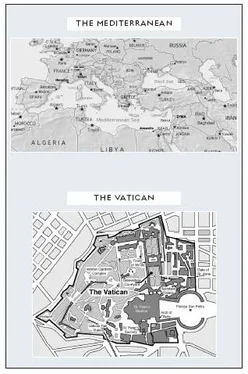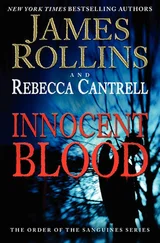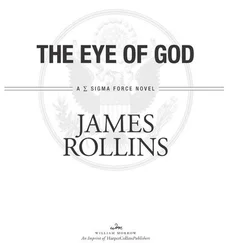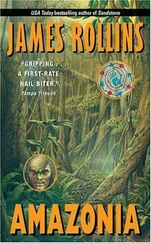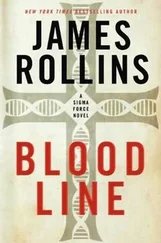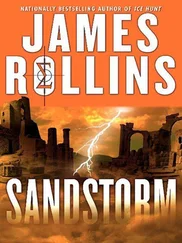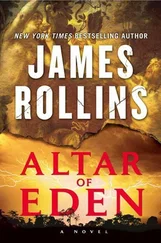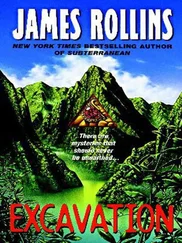Gray checked his watch. They had taken off half an hour ago. The two hours remaining until they landed in Alexandria was all the time the group had to strategize. The few hours of downtime in Rome had at least helped revive the group. They had left before dawn, sneaking out of Vatican City without alerting anyone of their departure.
Director Crowe had arranged additional cover at his end, setting up a dummy flight plan to Morocco. He had then used his contacts with National Reconnaissance Office to change their call signs in mid-flight as they turned for Egypt. It was the best they could do to cover their tracks.
Now there remained only one detail to iron out.
Where to begin their search in Alexandria?
To answer this, the Citation X’s cabin had been turned into a research think tank. Kat, Rachel, and Vigor all hunched over workstations. Monk was up in the cockpit, coordinating transportation and logistics once on the ground. The man had already taken apart and inspected his new Scattergun. He kept it with him. As he stated, “I feel naked without it. And trust me, you wouldn’t want that.”
In the meantime, Gray had his own investigation to pursue. Though it was not directly related to the immediate question, he intended to research further into the mystery of these m-state superconductors.
But first…
Gray stood and crossed to the trio of researchers. “Any headway?” he asked.
Kat answered, “We’ve divided our efforts. Scouring all references and documents beginning before Alexander’s birth and continuing through his death and the eventual disappearance of his tomb.”
Vigor rubbed his eyes. He’d had the least sleep of any of them. A single hour nap. The monsignor had taken it upon himself to do some further research among the stacks at the Vatican Archives. He was sure that the head prefect of the libraries, the traitor Dr. Alberto Menardi, was the mastermind behind solving the riddles for the Dragon Court. Vigor had hoped to track the prefect’s footsteps, to gain some additional insight. But little had been discerned.
Kat continued, “Mystery still surrounds Alexander. Even his parentage. His mother was a woman named Olympias. His father was King Philip II of Macedonia. But there’s some disagreement here. Alexander came to believe his father was a god named Zeus Ammon, and that he himself was a demigod.”
“Not exactly humble,” Gray said.
“He was a man of many contradictions,” Vigor said. “Prone to drunken rages, but thoughtful in his strategy. Fierce in his friendships, but murderous when crossed. He dabbled with homosexuality, but married both a Persian dancer and the daughter of a Persian king, this last in an attempt to unite Persia and Greece. But back to his parentage. It was well known that his mother and father hated each other. Some historians believe Olympias may have had a hand in assassinating King Philip. And what’s interesting is that one writer, Pseudo-Callisthenes, claimed Alexander was not the son of Philip, but instead was the son of an Egyptian magician to the court, named Nectanebo.”
“A magician…as in magi ?” Gray understood the implication.
“Whoever his parents truly were,” Kat continued, “he was born on July 20, 356 B.C.”
Vigor shrugged. “But even that might not be true. On that same date, the Temple of Artemis in Ephesus burned down. One of the Seven Wonders of the ancient world. The historian Plutarch wrote that Artemis herself was ‘too busy taking care of the birth of Alexander to send help to her threatened temple.’ Some scholars believe the choice of date might be propaganda, the true date of Alexander’s birth moved to match this portentous event, portraying the king as a phoenix rising from the ashes.”
“And a rise it was,” Kat said. “Alexander lived only to thirty-three, but he conquered most of the known world during his short life. He defeated King Darius of Persia, then went on to Egypt, where he founded Alexandria, then on to Babylonia.”
Vigor finished, “Eventually he moved east into India, to conquer the Punjab region. The same region where Saint Thomas would eventually baptize the Three Magi.”
“Uniting Egypt and India,” Gray noted.
“Connecting a line of ancient knowledge,” Rachel said, stirring from her own laptop. She didn’t raise her eyes, still focused on her research, but she did work a kink from her back.
Gray liked the way she stretched, slow, unhurried.
Maybe she noticed his study. Without turning her head, just her eyes flicked toward him. She stuttered a moment, glancing away. “He…Alexander even sought out Indian scholars, spending a significant amount of time in philosophical discussions. He was very interested in new sciences, having been taught by Aristotle himself.”
“But his life was cut short,” Kat continued, drawing back Gray’s attention. “He died in 323 B.C. In Babylon. Under mysterious circumstances. Some say he died of natural causes, but others believe he was poisoned or contracted a plague.”
“It is also said,” Vigor added, “that upon his deathbed in the royal palace of Babylon, he gazed out upon the city’s famous Hanging Gardens, a tower of sculpted terraces, rooftop gardens, and waterfalls. Another of the Seven Wonders of the ancient world.”
“So his life began with the destruction of one and ended at another.”
“It may just be allegorical,” Vigor conceded. He scratched at the beard under his chin. “But Alexander’s history seems strangely tied to the Seven Wonders. Even the first compilation of the Seven Wonders was made by an Alexandrian librarian named Callimachus of Cyrene in the third century B.C. The towering bronze statue in Rhodes, another of the Wonders, the ten-story Colossus that spanned the island’s harbor and held up a fiery torch, like your Statue of Liberty, was modeled after Alexander the Great. Then there’s the Statue of Zeus in Olympia, a glowering four-story figure of gold and marble. By Alexander’s own claim, possibly his real father. And there can be no doubt that Alexander visited the Pyramids of Giza. He spent a full decade in Egypt. So Alexander’s fingerprints seem to be all over these masterpieces of the ancient world.”
“Can this be significant?” Gray asked.
Vigor shrugged. “I can’t say. But Alexandria itself was once home to another of the Seven Wonders, the last to be built, though it no longer stands. The Pharos Lighthouse of Alexandria. It rose from a spit of land extending into the harbor of Alexandria, splitting the bay into two halves. It was a three-tiered tower of limestone blocks, held together by molten lead. It rose taller than your Statue of Liberty, some forty stories. At its top, a fire burned in a brazier, amplified by a gold mirror. Its light guided boat pilots from as far away as fifty kilometers. Even today, the very name lighthouse harkens back to this Wonder. In French, phare . In Spanish and Italian, faro .”
“And how does this connect to our search for Alexander’s tomb?” Gray asked.
“We were pointed to Alexandria,” Vigor said. “Chasing clues left by an ancient society of magi. I can’t help but think that the lighthouse, this shining symbol of a guiding light, would be significant to this group. There’s also a legend surrounding the Pharos Lighthouse — that its golden light was so potent that it could burn ships at a distance. Perhaps this hints back to some unknown source of power.”
Vigor finally sighed and shook his head. “But how this all hangs together, I don’t know.”
Gray appreciated the monsignor’s intellect, but he needed more concrete information, something to pursue once they arrived in Alexandria. “Then let’s go directly to the heart of the mystery. Alexander died in Babylon. What happened after that?”
Читать дальше
